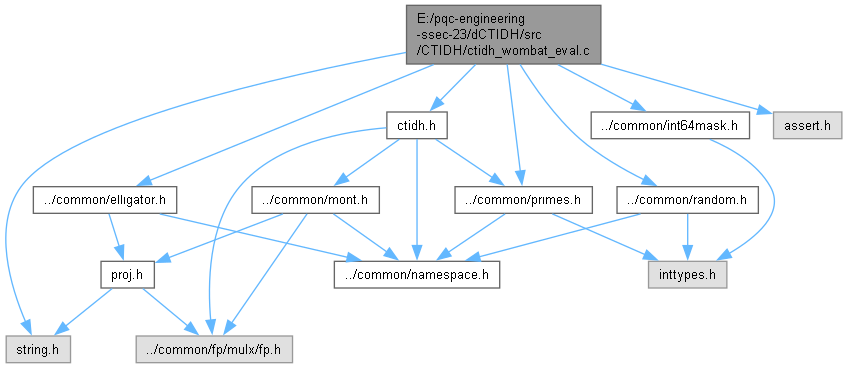Loading...
Searching...
No Matches
#include <string.h>#include <assert.h>#include "ctidh.h"#include "../common/primes.h"#include "../common/int64mask.h"#include "../common/elligator.h"#include "../common/random.h"
Include dependency graph for ctidh_wombat_eval.c:

Go to the source code of this file.
Functions | |
| void | fulltorsion_points (fp u, fp const a) |
| void | action (public_key *out, public_key const *in, private_key const *priv) |
| bool | csidh (public_key *out, public_key const *in, private_key const *priv) |
Variables | |
| const public_key | base = {.A = {0}, .seed = ELLIGATOR_SEED} |
Function Documentation
◆ action()
| void action | ( | public_key * | out, |
| public_key const * | in, | ||
| private_key const * | priv | ||
| ) |
Definition at line 177 of file ctidh_wombat_eval.c.
178{
179
180 init_counters();
181
185
188
190 fp seed;
191 fp_set(seed, in->seed);
192 fp_enc(seed, seed);
194
197
198 // clear ells not used in the keyspace
200 {
203 }
204
205 // collect primes not used in the key ...
207 // int16_t unused[255] = {0};
208
213 {
214#ifdef ENABLE_CT_TESTING
218#endif
219
221
223
229
234 }
235
236 // ... and remove them from our points
239 {
242 tmp_b++;
243
246
249 }
250
251 // ACTION!
252 // copy "outer" points
255
258 {
260
261 // outer points are now the inner points
264
265 // remove degrees not in the batch
266 tmp_b = 0;
268 {
270 tmp_b++;
271
274
277 }
278
279
281 {
284 // 0 -> dummy, 1 -> + direction, 2 -> - direction
286
287 uint64_t lowerend_ell = primes[batch_start[current_batch] + batch_numkeys[current_batch] - inner_counter - 1];
289 // printf("%3d: %2d - %4ld-isogeny to %ld for cost of (%4ld,%4ld)\n",
290 // current_key, current_batch, current_ell, direction, lowerend_ell, upperend_ell);
291
292 // multiply out other factors
296
297 // we skip the "last/already processed" and remove only the "other" degrees
298 for (int16_t j = batch_keybounds_start[current_batch]; j < batch_keybounds_stop[current_batch] - inner_counter; j++)
299 {
300 xMUL_dac(&K, &A24, 0, &K, lookup(priv->ells[j], primes_dac), lookup(priv->ells[j], primes_daclen), batch_maxdac[current_batch]);
301 }
302
303 // make a copy to trow away in the dummy case
310 proj_copy(&A_, &A);
311 // we can now compute the isogeny
313 {
314 // this is the last isogeny we need to compute! so we don't need to push points
316 }
318 {
319 // on the last isogeny of the batch, we only need to push the 2 "outer" points
321 }
323 {
324 // on the last batch, we only need the inner points
326 }
328 {
329 // on the second to last isogeny of a batch, we only need to push 3 points
330 // the one needed for the last isogeny of the batch + the two outer points
331 proj_cswap(&Points_[0], &Points_[1], -int64mask_equal(priv->directions[current_key - 1], (int64_t)2));
333 proj_cswap(&Points_[0], &Points_[1], -int64mask_equal(priv->directions[current_key - 1], (int64_t)2));
334 }
335 else
336 {
338 }
339
340 // skip isogeny in case of dummy isog
346
348
349
352
353 // needed to remove the order incase a dummy isogeny was used
355 {
356 // not needed for the inner points in the last round
358 {
359 proj_cswap(&Points[0], &Points[1], -int64mask_equal(priv->directions[current_key - 1], (int64_t)2));
361 proj_cswap(&Points[0], &Points[1], -int64mask_equal(priv->directions[current_key - 1], (int64_t)2));
362 }
363 else
364 {
367 }
368 }
369
371 {
374 }
375
376 inner_counter++;
377 }
378 }
379
383}
References public_key::A, batch_keybounds_start, batch_keybounds_stop, batch_maxdac, batch_numkeys, batch_start, batch_stop, elligator_seeded, fp_1, fp_cmov, fp_copy, fp_enc, fp_inv, i, j, primes, primes_dac, primes_daclen, xA24, xISOG_matryoshka, and xMUL_dac.
◆ csidh()
| bool csidh | ( | public_key * | out, |
| public_key const * | in, | ||
| private_key const * | priv | ||
| ) |
Definition at line 386 of file ctidh_wombat_eval.c.
387{
389 {
391 return false;
392 }
394 return true;
395}
References public_key::A, action, fp_random, i, and validate.
◆ fulltorsion_points()
Definition at line 94 of file ctidh_wombat_eval.c.
95{
98
99 // Convert curve to projective Montgomery form (A' + 2C : 4C)
101 fp_set1(A.z);
105
106 fp_set0(u); // u <- 0
108
109 do
110 {
111
112#ifdef ENABLE_CT_TESTING
121#endif
122
125
126 clearpublicprimes(&Tp, &A);
127 clearpublicprimes(&Tm, &A);
128
129#ifdef ENABLE_CT_TESTING
131#endif
134 continue;
135
136#ifdef ENABLE_CT_TESTING
138#endif
141 continue;
142
143 // Checking if Tp is an order (p+1)/(2^e)
146 boolp = 1;
152
154 continue;
155
156 // ---> This can be removed for wd1 style
157 // Checking if Tm is an order (p+1)/(2^e)
160
161 boolm = 1;
167
169 continue;
170 // <---
172
174}
References a, cofactor_multiples, elligator_seeded, fp_1, fp_add, fp_copy, fp_dec, i, and j.
Variable Documentation
◆ base
| const public_key base = {.A = {0}, .seed = ELLIGATOR_SEED} |
Definition at line 24 of file ctidh_wombat_eval.c.